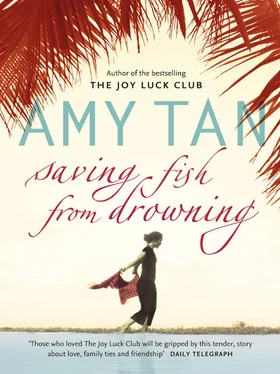1 ...8 9 10 12 13 14 ...27 The remark about Shangri-La, for example: I had intended to follow that with a discussion about the various permutations of “Shangri-La” notions. Certainly it is a cliché used to lure tourists to any site—from Tibet to Titicaca—that resembles a high mountainous outpost. Shangri-La: ethereally beautiful, hard to reach, and expensive once you get there. It conjures words most delightful to tourists’ ears: “rare, remote, primitive, and strange.” If the service is poor, blame it on the altitude. So compelling is the name that right this minute, workmen, bulldozers, and cement trucks are busily remodeling a ham-let near the China – Tibet border that claims to be the true Shangri-La.
I would have brought up the link to geography as well, the descriptions of the botanist Joseph Rock, whose various expeditions for National Geographic in the 1920s and early 1930s led to his discovery of a lush green valley tucked in the heart of a Himalayan mountain topped by a “cone” of snow, as described in his article published in 1931. Some of the inhabitants there were purported to be more than a hundred fifty years old. (I have met demented residents at old-age homes who have made similar claims.) James Hilton must have read the same article by Rock, for soon after, he used similar descriptions in penning the mythical Shangri-La. Voilà, the myth was hatched, delusions and all.
But the most interesting aspect to me is the other Shangri-La alluded to in Lost Horizon , and that is a state of mind, one of moderation and acceptance. Those who practice restraint might in turn be rewarded with a prolonged life, even immortality, whereas those who don’t will surely die as a direct result of their uncontrolled impulses. In that world, blasé is bliss, and passion is sans raison. Passionate people create too many problems: They are reckless. They endanger others in their pursuit of fetishes and infatuations. And they self-agitate when it is better to simply relax and let matters be. That is the reason some believe Shangri-La is so important as the antidote. It is a mindset for the masses—one might bottle it as Sublime Indifference, a potion that induces people to follow the safest route, which is, of course, the status quo, anesthesia for the soul. Throughout the world you can find many Shangri-Las. I have lived in my share of them. Plenty of dictators have used them as a means to quell the populace—be quiet or be killed. It is so in Burma. But in art, lovely subversive art, you see what breaks through in spite of restraint, or even because of it. Art despises placidity and smooth surfaces. Without art, I would have drowned under still waters.
THERE WAS NOTHING PLACID about Wendy Brookhyser. She had come to Burma with an itch in her brain and a fever in her heart. She wanted to fight for Burmese rights, for democracy and freedom of speech. She could not tell anyone that, however. That would be dangerous. To her fellow travelers, Wendy said she was the director of a family foundation. And that was indeed the case, a foundation set up by her mother, Mary Ellen Brookhyser Feingold Fong, the “marrying widow,” as she was unkindly called in some circles. For her position as director, Wendy had never done much more than attend an occasional meeting. For that, she received a salary sufficient for a carefree lifestyle with regular infusions from her mother for her birthday, Christmas, Chanukah, and Chinese New Year. Money was her birthright, but since her teens, she was adamant she would not become a party-throwing socialite like her mother.
Here I must interject my own opinion that the aforementioned mother was not the senseless schemer her daughter made her out to be. Mary Ellen gave the best parties to draw attention to worthy causes. She didn’t simply write checks to charities like other nine-digit doyennes who had generous pocketbooks but not the time to amplify their compassion. She was utterly involved, financially and morally. I knew this because Mary Ellen was a friend of mine—yes, I believe I can call her that, for we chaired a fair number of events together. And she was quite the compulsive organizer, one who attended every boring planning meeting. I’m afraid I had a rather embarrassing habit of dozing at some of those. Mary Ellen was all about details; she knew if the proposed dates for events conflicted with the social calendars of the big money-givers. And because of her social web, she could line up celebrities to generate “publicity heat,” identifying the singers, movie stars, or athletes who could be inveigled on the basis of their family background of genetic disease, mental illness, addiction, cancer, murder, sexual abuse, senseless tragedy, and other sorts of unhappinesses that fuel causes and then galas for causes. She also kept a meticulous record of those black-tie events for which she had bought tables at the highest level, and whose event chair might then be vulnerable to the unspoken but well-understood system of payback. It was all based on connections and intimate gossip, don’t you see. In any case, I knew I could always count on Mary Ellen to contribute yearly to Self-Help for the Elderly by pointing out that it served those with Alzheimer’s, the illness to which her first husband had succumbed; he was, by the way, the one who practically invented PVC pipes and made a huge fortune distributing them. Ernie Brookhyser. Perhaps you’ve heard of him. One of the many benefits Mary Ellen had attended was for the Asian Art Museum. During the live auction, she was high bidder for the Burma Road trip—paid thrice the value, I was pleased to see. She then gave the trip for two to Wendy as a birthday present.
Wendy had first thought to refuse the trip and also rebuke her politically unconscious mother for thinking her daughter might holiday in a country run by a repressive regime. She had fumed about this over lunch with a former Berkeley housemate, Phil Gutman, the director of Free to Speak International. Phil thought the all-expenses-paid trip might be useful for “discreet information-gathering.” It could be a humanitarian project, and a necessary one. Wendy might masquerade as a pleasure-seeker, go along with the happy-go-lucky tourists, and when the opportunity presented itself, she could talk to Burmese students, have casual conversations with natives to learn who among their neighbors, friends, and family members were missing. Free to Speak might later float her report as a spec piece for The Nation. But Phil also underscored that she had to be extremely careful. Journalists were prohibited from visiting Burma. If caught rummaging around for antigovernment views, they and their informants would be arrested, possibly tortured, and made to disappear into the same void into which thousands had gone before them. Worse, the government there would deny that it detained any political prisoners. And there you would be, invisibly imprisoned, forgotten by a world that had secretly concluded you must have had some degree of guilt for getting yourself in such a jam. You see what happened to that American woman in Peru, Phil said.
“Keep the rest of the group ignorant of your activities,” he cautioned Wendy, “and no matter how strongly you feel, don’t engage in activities that would jeopardize the safety of others. If you’re worried, I might be able to rearrange my schedule and come with you. You said there were two tickets, didn’t you?”
Their conversation drifted from lunch into dinner. Phil made suggestive remarks, picking up on the flirtation they had had while housemates, which Wendy never acted on. She thought he looked spongy, like a Gumby toy with bendable limbs and no muscle. She liked hard bodies, tight butts, chiseled jawlines. Bad Boy Scout was her version of sexy. But the more they talked and drank, the more impassioned she became about the plight of other people, and that impassioned sense transformed into sexual passion. She saw Phil as an unsung hero, a freedom fighter, who would one day be as admired as Raoul Wallenberg. With these heroics in mind, she let Phil think that he had seduced her. He was an awkward lover, and when he nibbled her ear and said nasty words, she had to suppress her laughter. Back in her apartment and alone in her own bed, she wrote about the experience in her journal. She was pleased that she had had sex with him. It was her gift to him. He deserved it. But would she do it again? Not a good idea. He might start thinking that the sex was more meaningful than it was. Besides, he had so much hair on his back it was kind of like having sex with a werewolf.
Читать дальше












